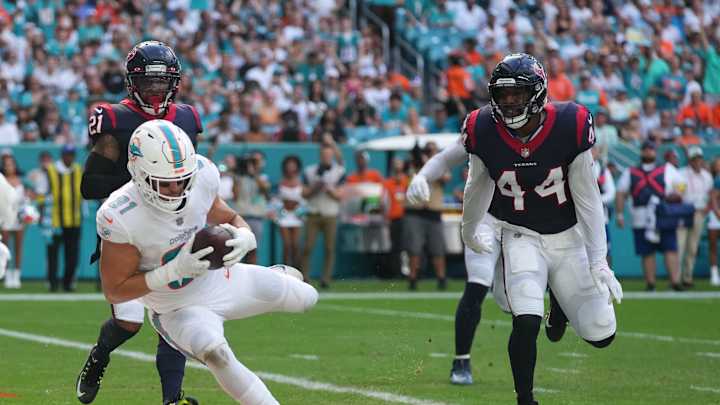Smythe Extension Good Business for Dolphins

Considering Durham Smythe has started 56 of the 79 games he’s played for the Miami Dolphins the past five seasons, it is disrespectful to not view the tight end as a proven starter.
That should/could explain why the Dolphins announced Monday they extended the 2018 fourth-round pick, adding two more years to his existing contract, which was slated to pay him $3.5 million in base salary and per-game roster bonuses before the deal got reworked.
The extension is worth $7.75 million, according to NFL.com, and guarantees the former Notre Dame standout $5.5 million. The new years on the contract also reportedly has a max value of $8.75 million. He'll earn $4.5 million of that in 2023.
We’ll have to wait for more details to understand whether the new contract lightens Smythe’s cap figure of $4.2 million for 2023, helping the Dolphins create a little more spending freedom. But what is clear is that Smythe, who is primarily used as an in-line tight end, serving as a run and pass blocker, is viewed as a valuable cog to Miami’s offense.
And, more importantly, Smythe, who caught 15 of the 20 passes thrown his way last season and turned those receptions into 129 yards and a touchdown, is a leader who the Dolphins likely will lean on to mentor other tight ends, possibly a youngster the team selects with the 51st or 84th pick in the 2023 NFL draft.
SIX TIGHT ENDS WORTH DRAFTING EARLY
Most draft analysts claim this is the best draft class for tight ends since 2019, when T.J. Hockenson, Noah Fant, Irv Smith and Dawson Knox came out.
Five tight ends were taken in the first two rounds that year, and this year we could see six tight ends taken in the first two to three rounds of the draft.
Notre Dame’s Michael Mayer, Utah’s Dalton Kincaid, Iowa’s Sam LaPorta, Georgia’s Darnell Washington, Oregon State’s Luke Musgrave and South Dakota’s Tucker Kraft are labeled as top 75 prospects in this draft.
Each of those tight ends brings something different, but they all would potentially fit well into Miami's offense.
It would be beneficial for Miami to select one of those tight ends to upgrade the team’s talent at the position, and replenish one of the roster's thinner spots.
This offseason the Dolphins let Mike Gesicki sign with the New England Patriots as a free agent, likely because he didn't fit well into the offense, have not re-signed Adam Shahen, who missed all of last season with a knee injury, and released Cethan Carter.
OPEN COMPETITION FOR PLAYING ROLE
Miami did add Eric Saubert, a six-year veteran who has started 15 games during his journeyman career, but only $500,000 of his incentive-laden $1,685,000 deal is guaranteed.
Saubert's price tag hints that Miami’s talent evaluators view Saubert, who has caught 33 passes for 280 yards and two touchdowns during his six-year career, as more of a role player, special teams contributor than front-line starter.
Tanner Conner, a former college receiver who showcased upside during training camp last summer and was stashed on the 53-man roster all season, is the only other tight end on the roster. It’s possible that this Idaho State standout could blossom into a starter, but that kind of development doesn’t happen overnight.
Considering the Dolphins often use two-tight-end sets in Mike McDaniel’s offense, more depth is needed. And if that player is young, it helps to have a veteran who doesn’t feel threatened in the room to serve as a mentor.
A mutually beneficial contract extension should provide Smythe the kind of security and reassurance he needs to continue filling that role.
And it certainly doesn’t hurt to have a reliable in-line blocker under contract for a couple more seasons, especially if it’s at an affordable rate, which Smythe is considering he’ll earn less than $5 million a season for the next three years.
